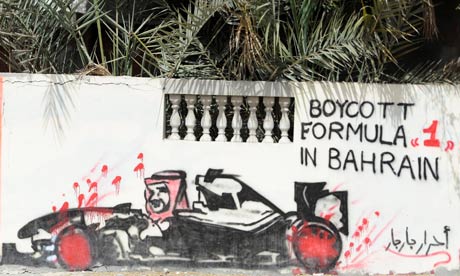
Anti-F1 graffiti in the Bahraini capital Manama, where the Grand Prix event is to take place on Sunday. Photograph: Mazen Mahdi/EPA
Bahrain is braced for three days of protests to mark the controversialFormula One Grand Prix as the government and organisers insisted that the event would proceed as planned.
Sporadic clashes that saw riot police firing tear gas and stun grenades at protesters broke out as the authorities in the Gulf island state sought to project an image of stability before Sunday's big race.
Violence caught up with F1 when Force India team members were forced to flee as petrol bombs were thrown over their vehicle on their way back from the Grand Prix racing track at Sakhir. The four mechanics were apparently not deliberately targeted but caught up in a clash between protesters and police.
Demonstrators in Manama, the capital, were also hit by tear-gas. In one march, hundreds of people – some chanting slogans against Formula One – clashed with security forces as they shouted support for a jailed Shia opposition activist, Abdulhadi al-Khawaja, who has been on a hunger strike for more than two months and is now said to be close to death.
"Manama is under a police lockdown," tweeted activist Ala'a Shehabi.
Scores of foreign journalists were reported to have been turned away at Manama airport.
Bahrain's Grand Prix was cancelled last year when protests pitted the island's Shia majority against the western-backed Sunni Al-Khalifa monarchy. The unrest erupted after the first Arab Spring uprisings in Egypt and Tunisia, but was contained with the help of Saudi troops. Bahrainis called it the Pearl Revolution. Up to 70 people have been killed since then.
Bahrainis say it should be relatively easy to guard the desert racing circuit, though determined protesters with tickets to the event could slip past security.
Opposition supporters complained of the use of birdshot by the security forces, as well as night raids to round up activists. Both practices had been abandoned for several months. The activist group Bahrain Watch reported "a dramatic escalation" in the use of birdshot and live ammunition by police against protesters over the past week, as well as a marked increase in related injuries.
It said many individuals reported being injured in the back, raising serious questions about whether police are using proportional force and are discharging their firearms only as a last resort, as required by Bahrain's new police code of conduct.
Britain's foreign office said it expected "protests and disruption in various areas to continue through the coming days."
John Yates, a former assistant commissioner of the metropolitan police, who is now advising the Bahraini authorities, told the Guardian on Wednesday that there were certain to be protests over the weekend. But his claim that no abuse was taking place because if it was it "would be on YouTube", was immediately challenged by unverified video which purported to show police beating protesters.
The Bahraini government says it has security under control. It also appears to be seeking to exploit divisions between the main legal Shia opposition movement, al-Wefaq, and smaller radical groups composed of younger people that are in the forefront of protests. A government PR agency distributed comments by a former al-Wefaq MP, Jasim Husain, who said: "I can tell you that most people in Bahrain are happy and pleased that F1 is back in Bahrain, given its effects on the economy and the social aspects of it. Many are happy and pleased. I see this as a sporting and economic event, rather than a political event. Security has never been a big issue in Bahrain. The protests are very much peaceful; largely people are having political issues which have to be addressed one way or another."
But democracy activists accused the government of targeting sports personalities. "In Bahrain we see doctors, teachers, nurses, professionals and athletes being targeted in the most terrible fashion," said Salman Kamal al-Deen, general secretary of the Bahrain Human Rights Society. "It is the duty of everyone to carry our message to the rest of the world." According to the BHRS, over 160 athletes have been imprisoned since last year's protests and 23 of these are still behind bars.
Tariq Alfarsani, the body building champion who was Bahrain's athlete of the year in 2002, was arrested from April to June last year for protesting. He said: "I was sacked from my job as a military officer. I was also shown on state TV and portrayed as a traitor. I can't get over the shame of that. But if I was a true traitor I would still be in prison. "Now, when I go shopping or go to airports, I am recognised and have trouble."
A government spokesman interrupted the BHRS press conference and pointed out that the fact that meetings such as this were allowed to take place showed there was freedom and reform in Bahrain.
But he was countered by Shehabi and Nabeel Rajab, two of the country's best known activists, who told the official that they were not going to debate with him. The official looked uneasy that the event was being tweeted and that the proceedings were being streamed online.
Earlier this week, British MPs wrote to Formula One sponsors warning them they risked damaging their brands by supporting the race. In another appeal, Index on Censorship said: "The Bahraini government wants to bask in the positive international publicity it anticipates receiving through the Formula One motor race going ahead. Yet all the signs are that the government is likely to intensify its harsh clampdown on local activists before and during the Grand Prix, with these and other so-called 'security measures' risking endangering human rights activists, racegoers and Formula One team members alike."

No comments:
Post a Comment
Note: Only a member of this blog may post a comment.